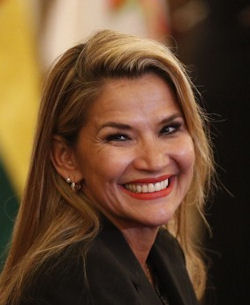Jeanine Áñez
 In November 2019, Jeanine Añez temporarily assumed the Presidency of Bolivia amid a political and social crisis in which former President Evo Morales (2006-2019) was pressured to resign by civic mobilizations, police rebellion and suggestions from the Armed Forces. According to her lawyers, Añez "did not execute any coup d'etat" since she legally assumed the Bolivian presidency after "the power vacuum" that occurred in the last quarter of 2019.
In November 2019, Jeanine Añez temporarily assumed the Presidency of Bolivia amid a political and social crisis in which former President Evo Morales (2006-2019) was pressured to resign by civic mobilizations, police rebellion and suggestions from the Armed Forces. According to her lawyers, Añez "did not execute any coup d'etat" since she legally assumed the Bolivian presidency after "the power vacuum" that occurred in the last quarter of 2019.
At the head of the interim government from November 2019 to November 2020, Jeanine Añez had promised as soon as she took office to quickly call general elections, but the ballot had to be postponed several times, in particular due to the coronavirus pandemic.
At first glance, the new president of Bolivia, Jeanine Áñez, was a glamorous woman, with blonde hair, elegant and good-natured. Characteristics that made the "Angelina Jolie of the Legislative" be called in the corridors of the Parliament. Jeanine Áñez was born on June 13, 1967 in San Joaquín, a small town in the department of Beni, northwest of the country. Áñez graduated as a lawyer and began her television career as a news anchor. Her political life dates back to two legislatures as a state senator, the first from 2010 to 2015 and the second from 2015 that should end in 2020, both, being contrary to the government of Evo Morales as an activist of the small right-wing Unidad Democratica party.
On 12 November 2019 after the resignation of President Evo Morales, and a wave of resignations -which included that of the vice president, the presidency of the Senate, that of the Deputies and the first vice-presidency of the Senaduría, her position was the following by succession to occupy the Presidency. Thus Áñez, after a frustrated attempt, for lack of quorum -as dictated by the Political Constitution-, of a legislative assembly to designate who would be the replacement of Morales, arrived at the old Government Palace in La Paz and premiered as the sixty-sixth president of the Plurinational State of Bolivia.
When a new election took place in October 2020, Luis Arce, an ally of Morales, was elected the winner in a landslide. On 14 March 2022, former interim President of Bolivia Jeanine Áñez appeared in front of a judge via video after her arrest the day before for terrorism, sedition, and conspiracy.
Bolivia's First Anti-Corruption Sentencing Court reinstated the trial against former president Jeanine Áñez in June. The former president was on trial for the past coup d'état against Evo Morales and for crimes against humanity such as those in Senkata and Sacaba.
On 10 June 2022 Bolivian Justice sentenced former de facto president Jeanine Añez (2019-2020) to 10 years in prison on Friday night for her involvement in the 2019 coup case, according to the ruling of the First Sentencing Court of La Paz. The president of the First Anticorruption Sentencing Court of La Paz, Germán Ramos, read out the sentence for crimes of breach of duties, resolutions contrary to the laws and against the Political Constitution of the State (CPE), committed in his rise to power in November 2019 following the resignation of Evo Morales, who had won a new term as head of state but was forced to resign.
The prosecution, formed by the Prosecutor's Office, the Attorney General's Office, the Ministry of Government and the Senate, requested in their final arguments 15 years in prison for Áñez and the other six defendants, who are members of the police and military high command. Military officers Flavio Arce San Martín and Jorge Mendieta Ferrufino were also sentenced to three and two years, respectively. Two other generals of the Armed Forces, Sergio Orellana and Jorge Fernández Torranzo, fugitives, were also sentenced to four years in prison.
The Bolivian Attorney General's Office requested 15 years in prison for the coup-leader Jeanine Áñez. This happen when the trial against her resumed after being paralyzed since April due to maneuvers carried out by her defense attorneys. "The Prosecutor's Office will ask the Sentencing Court for a sentence of 15 years for Mrs. Jeanine Añez," Attorney General Juan Lanchipa said, adding that he is ready for the hearing that is expected to be installed at 2:00 p.m. local time in a court of La Paz.
Over 70 pieces of evidence and almost twenty witness statements were presented in the "Coup d'état II" case, in which former Senator Añez is accused of breach of duties and unconstitutional resolutions. Her defense presented a new "recourse of complaint" at the headquarters of the Constitutional Court in Sucre city to challenge a rejection of a previous request through which she challenged the constitutionality of the procedures in the "Coup d'état II" case.
According to her lawyers, Añez "did not execute any coup d'etat" since she legally assumed the Bolivian presidency after "the power vacuum" that occurred in the last quarter of 2019. "It is cowardly that all those who endorsed her presidency and accompanied her wash their hands today," said Horacio Poppe, a far-right lawmaker. Former presidential candidate Carlos Mesa, Santa Cruz Governor Luis Camacho, and other politicians who backed the coup against President Evo Morales also argue that "there was no coup in 2019" and that Añez is a victim of political persecution and legal abuse.
The "Coup d'état II" case, however, accuses Añez of illegally assuming the country's highest functions after violating Senate regulations to assume the interim presidency. Previously, in the "Coup d'état I" case, she was charged with terrorism, sedition and conspiracy.
|
NEWSLETTER
|
| Join the GlobalSecurity.org mailing list |
|
|
|

